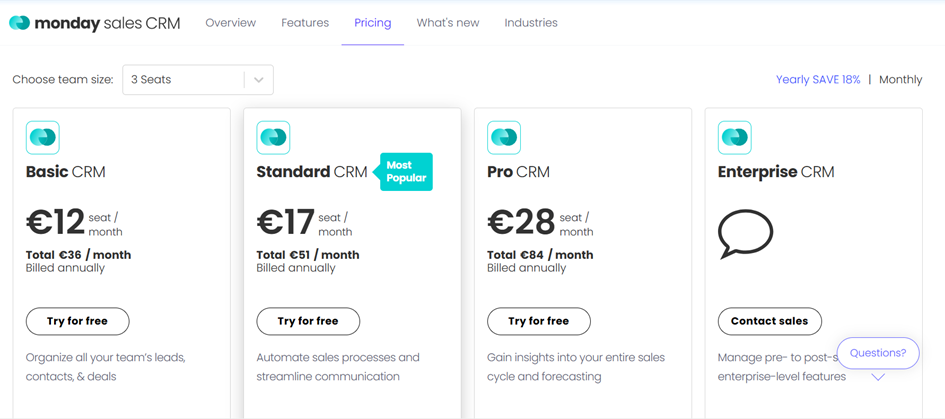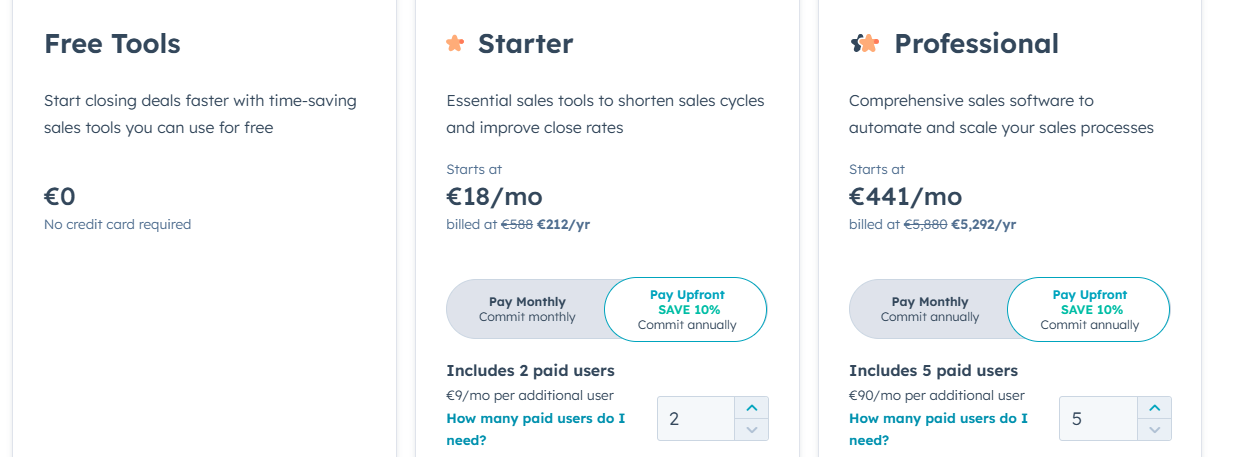HubSpot vs monday.com: Which CRM Offers More Possibilities?
HubSpot Sales Hub and monday.com sales CRM are customer relationship management (CRM) tools that users praise for their user-friendly interfaces and effective integrations, among other features. HubSpot and monday.com share the same mission: streamline sales processes, delve into customer data, and build stronger relationships with them. However, they achieve this in different ways, so it's worth taking a closer look at both.
HubSpot vs. monday.com
HubSpot CRM offers a range of cloud-based tools designed to increase company revenues. The platform integrates various products created to support sales, marketing, customer service, as well as CMS and tools dedicated to operations teams. Since its founding in 2006, HubSpot has been recognized as one of the best tools of its kind available in the market.
Monday.com is primarily a project management tool, and its monday sales CRM offering was recently launched. The addition was released in August 2022 and allows for managing leads and transactions, contacts, and sales manager dashboards.
Therefore, in the rest of the article, we will not compare the entire offerings of HubSpot and monday.com, as they have completely different goals and functionalities. Instead, we will compare solutions dedicated to sales, namely HubSpot Sales Hub and monday sales CRM.
HubSpot Sales Hub vs. monday sales CRM: how do they compare?
1. Features
HubSpot and monday.com offer sales-oriented CRM solutions that allow users to track contacts as they progress through the pipeline.
Unlike other alternatives, monday.com specializes in workflow automation and facilitating teamwork. Monday.com's sales CRM is presented as a fully configurable sales platform, allowing users to track transactions, manage pipelines, improve communication with customers, and view important data on simple navigational dashboards.
HubSpot, however, stands out with its extensive sales and marketing functionality. It offers an advanced level of pipeline management, allowing users not only to track transactions but also to automate tasks and gain insights into sales results. HubSpot clearly provides a different scale of tools, especially in terms of customer communication.
An example is email marketing tools. While monday.com has basic email functionality, it lacks advanced marketing features. HubSpot CRM, on the other hand, offers email scheduling, open rate metrics, response tracking, and templates, making it more suitable for marketing campaigns and maintaining contact with customers at the beginning of the purchasing journey.
2. Ease of use
Both HubSpot and monday.com are well-known for their user-friendly interfaces, making them worth considering for a CRM that won't frustrate employees.
Monday.com is considered the platform that can be compared to HubSpot in terms of intuitiveness. While HubSpot's interface is slightly less modern, the tool itself remains absolutely unmatched in balancing high functionality with ease of use.
If you're looking for a tool with an easy-to-use interface, both HubSpot Sales Hub and monday sales CRM are good choices. However, if you need a more complex tool with a wider range of features, HubSpot remains the top choice.
3. Customization
Monday.com advertises its sales CRM as "fully configurable." Users can edit transaction stages, add columns, and customize views to their needs. Such functionalities are useful for specific contact databases.
HubSpot customers can also customize the content and layout of navigational dashboards based on the user. For example, the marketing team will see only data directly correlated with attracting potential customers, while sales teams will see information that helps them close transactions. Unnecessary information flow is eliminated, and the system provides users with the data that genuinely aids them in their work.
4. Integrations
HubSpot offers far more integrations than monday.com, integrating with over 1000 different tools. Monday.com provides only 200 integrations, which is a significant difference. It's worth noting that monday integrates with some applications through third-party integrations, including Slack, Google apps, and Meta apps. Users seem satisfied with monday's integration offerings, although some acknowledge its limitations.
HubSpot's ability to integrate with thousands of tools makes it a better choice in this regard, especially for those who need to automate customer management in both sales and marketing teams.
5. Pricing
At first glance, monday.com's sales CRM is cheaper than HubSpot, especially when looking at more advanced plans. This makes it considered a more budget-friendly alternative to HubSpot, particularly for smaller firms with lower budgets. However, it's essential to note that:
- Only HubSpot offers a completely free basic CRM platform, while monday.com incurs charges from the first level (the free trial is the only free option).
- Prices in the monday sales CRM pricing are per user, while in the Sales Hub pricing, it's per package (covering different numbers of users depending on the level, with the option to add individual users). At the same time, monday.com only offers packages for predefined numbers of users, starting from a minimum of 3 and then 5.
- The features of monday sales CRM Standard roughly correspond to the Sales Hub Starter level, while monday Basic can be compared to the free HubSpot CRM.

Monday Sales CRM Pricing

HubSpot Sales Hub Pricing
Therefore, we see that the discrepancy in favor of HubSpot begins at the Professional level. What does this mean in practice? Let's use an example. If you plan to implement CRM that offers basic automations and email integration, used by 4 salespeople, the cost would be:
- €36 per month for HubSpot Sales Hub in the new customer offer.
- €85 per month for monday sales CRM (you must purchase 5 seats).
For one or two users, i.e., in the smallest team, the price is also in favor of Sales Hub:
- €18 per month is the cost of the smallest Sales Hub Starter package (2 users).
- €51 per month for the monday sales CRM Standard package (3 users).
Additionally, with a slightly larger amount, €20, you can purchase a package that includes the other Hubs in HubSpot. For users who need a multifunctional tool, effective integration between sales and marketing, and automation of many tasks, HubSpot in the CRM Suite option is unrivaled. To check current prices, it's best to consult the HubSpot pricing.
Furthermore, in implementation costs, it is crucial to consider integration costs with other tools, as mentioned in an article dedicated to CRM budgets. In this regard, HubSpot is more cost-effective because it has a larger integration library, resulting in fewer additional costs. It's worth taking this into account when comparing these two tools.
Summary: HubSpot or monday.com?
HubSpot has been a key player in the CRM space for a long time, but its competition, such as monday.com, is not idle. However, it should be noted that most alternatives to HubSpot are primarily targeted at smaller companies with limited sales and marketing support needs.
If you are looking for a lightweight option with a user-friendly UX and reporting, the features offered by monday sales CRM may catch your attention. If you want to combine sales and marketing with a multifunctional CRM, HubSpot may be the better option. If your company is looking for a higher level of functionality, HubSpot is unparalleled, allowing you to integrate sales, marketing, customer service, and CMS.
Do you want to learn more? Ask about additional comparison criteria? Or maybe learn about specific HubSpot functionalities? Contact us, and we will explain all the details and dispel any doubts. The support of our advisors will help you find a CRM that fits your business model.




